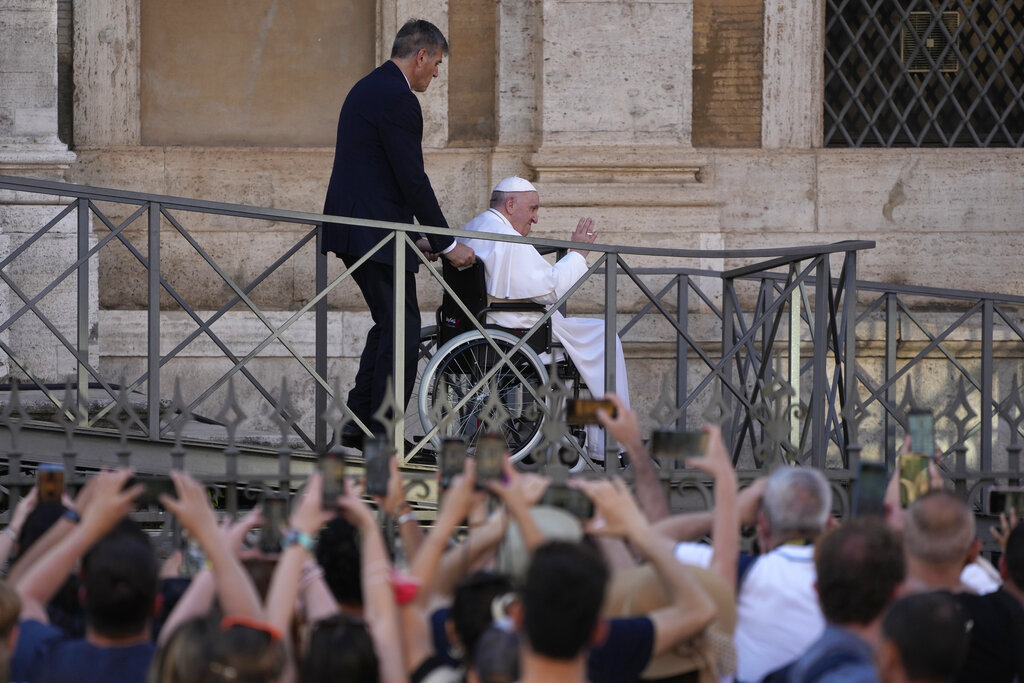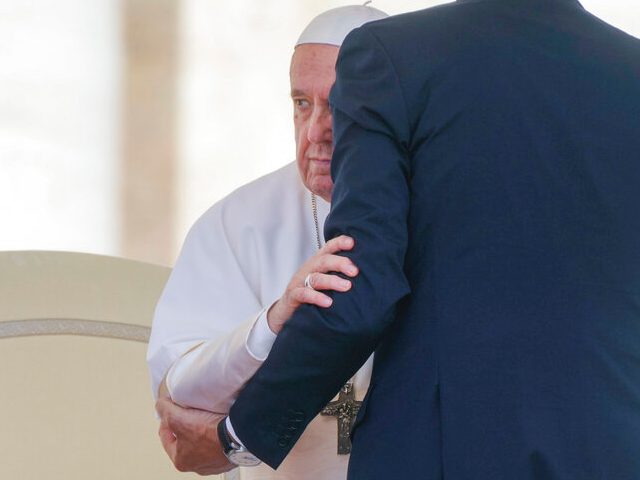ROME — The Vatican announced Friday that Pope Francis had canceled his July trip to Africa, fueling rumors of more serious health problems and even a possible papal retirement.
“At the request of his doctors, and in order not to jeopardize the results of the therapy that he is undergoing for his knee, the Holy Father has been forced to postpone, with regret, his Apostolic Journey to the Democratic Republic of Congo and to South Sudan, planned for 2 to 7 July, to a later date to be determined,” papal spokesman Matteo Bruni said in a statement.
Ever since the 85-year-old pontiff began regularly using a wheelchair beginning in early May, Vatican pundits began handicapping in earnest the likely papabili, or possible successors to Peter’s chair, a notoriously difficult task. The pope has suffered a series of health setbacks, including sciatica and the removal of a segment of his colon last summer.
On May 29, the pope announced a new batch of 21 cardinals to be given the red hat at a consistory to be held on August 27. Of these 21 cardinals, 16 are below the age of 80 and thus qualify to participate in a papal conclave to elect the next pope.
Barring unforeseen incidents, following the August consistory, the college of cardinals will be overwhelmingly the product of Francis appointments, with 83 voting-age cardinals having been named by Francis, 38 by Pope Benedict XVI, and just 11 by Pope John Paul II.
Writing for The Pillar Catholic, Vatican journalist Ed Condon noted recently that two traits have tended to characterize Francis’ criteria when choosing new cardinals: a concerted effort to universalize the college by naming non-Europeans from the ecclesiastical “peripheries” and the appointment of bishops “perceived to be most aligned with his own theological and pastoral styles.”
Condon went on to write that Francis’ tendency to mold the college in his own image represents “something of a departure from recent practice.”
“Previous recent popes, especially St. John Paul II and Benedict XVI, made it a visible habit to pick cardinals from among their ideological opponents, ensuring that even under supposedly conservative popes, outspoken progressives like Walter Kasper, Reinhart Marx, and Joseph Bernadin gave the college a catholic breadth of opinion for the pope to hear,” Condon observed.
Or, as veteran Vatican journalist John L. Allen, Jr., wrote, “it seems clear that, in the main, the 16 new electors are largely Francis loyalists, meaning prelates who share the pope’s broadly progressive vision.”
“Indeed, in several instances Francis seems to have bypassed important archdioceses traditionally led by cardinals in favor of smaller venues in the same neighborhood, with the common denominator being that those smaller places are led by his allies,” Allen added.
Along with the pope’s health issues and the announcement of a consistory, Francis further stoked speculation about the future of his pontificate by revealing his intention to visit the Italian city of L’Aquila in August for a feast created by Pope Celestine V, who resigned from the papacy in 1294, the last pope to do so before Pope Benedict XVI stepped down in 2013. Benedict himself visited Celestine’s tomb in 2009, some four years before his own resignation.
Francis has praised Benedict’s decision to resign as a “beautiful gesture of nobility, of humility and courage.”

Pope Francis greets the faithful as he leaves St. Mary Major Basilica after participating in a rosary prayer for peace, in Rome, Tuesday, May 31, 2022. Pope Francis canceled a planned July trip to Africa on doctors’ orders because of ongoing knee problems, the Vatican said Friday, June 10, 2022, raising further questions about the health and mobility problems of the 85-year-old pontiff. (AP Photo/Gregorio Borgia)
In 2018, Francis said he reflects on the hour when the Lord will call him to “step down,” a comment that generated widespread media speculation that the pope was considering retiring.
During an in-flight interview in 2014, Francis suggested he did not think his pontificate would be a long one.
“I try to think of my sins, my mistakes, so as not to think that I am somebody,” he said. “Because I know this will last a short time, two or three years, and then to the house of the Father.”
